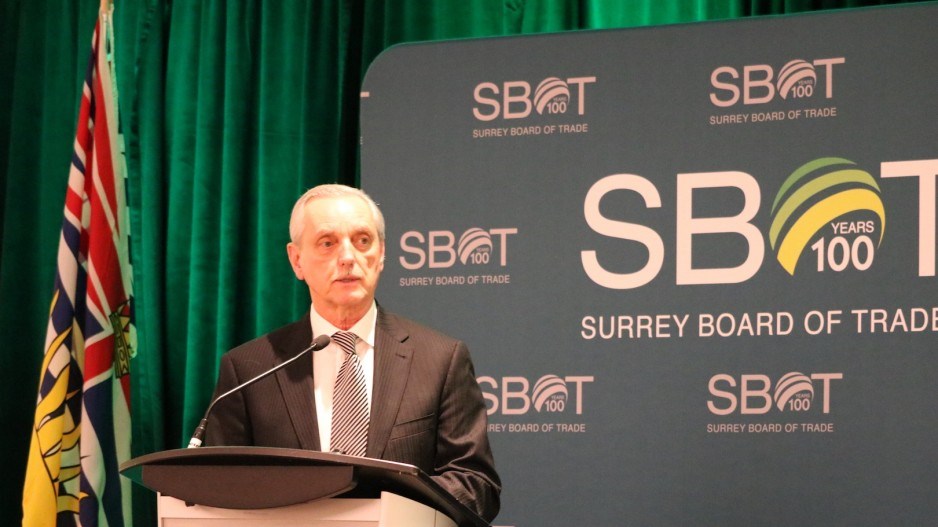Canadians can expect another five interest rate hikes in the next two years, according to Central 1 Credit Union’s chief economist.
Helmut Pastrick, speaking at a Surrey Board of Trade event on Thursday (Feb. 8), said the move by the Bank of Canada in January to bring the benchmark interest rate to 1.25% is the first of many to come to continue the economy’s “rate normalization phase.”
“I think there’s a very good chance we could see another quarter-point move in March,” said Pastrick, who spoke at the Sheraton Guildford Hotel in Surrey. “If not in March, then virtually 100% in April. And I would see another rate move in the summer months and potentially another one by the end of year. So three quarter-point moves by the Bank of Canada.”
Pastrick forecast another two quarter-point increases in 2019, which would bring the benchmark interest rate in Canada to 2.5%. He also forecast a rise in the 10-year government bond deal based on inflation expectations. He added rate increases right now are a good sign for Canada.
“The reason rates are going up is because the economy is good,” he said. “This is not where we’re in a situation where rates are going up because inflation is becoming a real problem and the central banks need to tap on the brakes to slow things down.”
Giovanni Gallipoli, an associate professor at the University of British Columbia’s school of economics, agreed with Pastrick’s assessment, noting the Bank of Canada and the U.S. Federal Reserve should raise both their benchmark interest rates in lockstep over the coming year as both economies continue to grow.
“To some extent, we will mirror the Federal Reserve,” he said. “So I would expect that the Federal Reserve will hike it at least four times in the next twelve to eighteen months, which would also be a conservative estimate for Canada. Unless something really goes wrong with either economy that seems to be the consensus right now. It is guesswork, things can change in twelve to 20 months of course.”
Gallipoli added if Canada’s benchmark interest rate got to 2.5% it would be a “return to normalcy.”
“Two point five per cent is definitely, by historical standards, fairly accommodating. In any other interest rate cycle, people would have said that 2.5 percent is at the low-end, but we live in very strange times where 2.5 percent is on the high-end of things. But if people can’t carry interest rates at 2.5 percent, perhaps some of them should not have bought in the first place.”
Pastrick also commented on the current market volatility rocking the U.S. stock exchange. He said the best outlook for Canadians to take concerning financial concerns is to realize the stock market and the overall economy don’t necessarily move in lockstep.
“There’s an old adage that the stock market has predicted nine of the last five recessions,” he said. “If we see equities drop about 20% then that probably means there’s some very negative fundamentals out there, or some geopolitical crisis, which also relates to economic fundamentals. But right now we’re seeing good economic fundamentals, so it’s not a harbinger of a more serious bear market in equities.”




